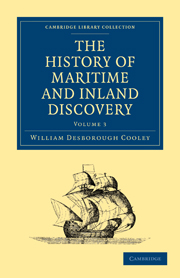Book contents
- Frontmatter
- Contents
- CHAP. I PROGRESS OF GEOGRAPHICAL SCIENCE
- CHAP. II VOYAGES OF BYRON, WALLIS, CARTERET, ETC
- CHAP. III COOK'S FIRST VOYAGE
- CHAP. IV COOK'S SECOND VOYAGE
- CHAP. V COOK'S THIRD VOYAGE
- CHAP. VI COOK'S THIRD VOYAGE CONTINUED
- CHAP. VII VOYAGE OF LA PEROUSE, ETC
- CHAP. VIII EUROPEANS IN THE SOUTH SEA
- CHAP. IX THE COASTS OF AUSTRALIA
- CHAP. X INTERIOR OF NEW HOLLAND
- CHAP. XI VANCOUVER'S VOYAGE
- CHAP. XII INTERIOR OF NORTH AMERICA
- CHAP. XIII ROSS AND PARRY
- CHAP. XIV PARRY'S VOYAGES
- CHAP. XV JOURNEY OF CAPTAIN FRANKLIN
- CHAP. XVI SECOND JOURNEY OF CAPTAIN FRANKLIN
- CHAP. XVII HUMBOLDT'S TRAVELS
- CHAP. XVIII HUMBOLDT'S TRAVELS CONTINUED
- CHAP. XIX SOUTHERN EXTREMITY OF AMERICA
- CHAP. XX EASTERN SHORES OF ASIA
- CHAP. XXI TRAVELS IN THE HIMALYEH
- CHAP. XXII BRUCE'S TRAVELS
- CHAP. XXIII PARK'S TRAVELS
- CHAP. XXIV DENHAM AND CLAPPERTON'S TRAVELS
- INDEX
CHAP. XXIV - DENHAM AND CLAPPERTON'S TRAVELS
Published online by Cambridge University Press: 05 October 2010
- Frontmatter
- Contents
- CHAP. I PROGRESS OF GEOGRAPHICAL SCIENCE
- CHAP. II VOYAGES OF BYRON, WALLIS, CARTERET, ETC
- CHAP. III COOK'S FIRST VOYAGE
- CHAP. IV COOK'S SECOND VOYAGE
- CHAP. V COOK'S THIRD VOYAGE
- CHAP. VI COOK'S THIRD VOYAGE CONTINUED
- CHAP. VII VOYAGE OF LA PEROUSE, ETC
- CHAP. VIII EUROPEANS IN THE SOUTH SEA
- CHAP. IX THE COASTS OF AUSTRALIA
- CHAP. X INTERIOR OF NEW HOLLAND
- CHAP. XI VANCOUVER'S VOYAGE
- CHAP. XII INTERIOR OF NORTH AMERICA
- CHAP. XIII ROSS AND PARRY
- CHAP. XIV PARRY'S VOYAGES
- CHAP. XV JOURNEY OF CAPTAIN FRANKLIN
- CHAP. XVI SECOND JOURNEY OF CAPTAIN FRANKLIN
- CHAP. XVII HUMBOLDT'S TRAVELS
- CHAP. XVIII HUMBOLDT'S TRAVELS CONTINUED
- CHAP. XIX SOUTHERN EXTREMITY OF AMERICA
- CHAP. XX EASTERN SHORES OF ASIA
- CHAP. XXI TRAVELS IN THE HIMALYEH
- CHAP. XXII BRUCE'S TRAVELS
- CHAP. XXIII PARK'S TRAVELS
- CHAP. XXIV DENHAM AND CLAPPERTON'S TRAVELS
- INDEX
Summary
The calamitous termination of Park's second journey might have been thought sufficient to damp the ardour of even the most enterprising; but the impulse of curiosity, and the encouragement of hope, still prompted many to face the dangers of a tropical climate, and of a journey through suspicious and bigotted nations. In 1798, Frederick Hornemann, a German of good education, was engaged by the African Association to attempt to penetrate to the Niger from the eastward. In September of that year he joined the caravan from Cairo to Fezzan. Of this ancient caravan route he has given an excellent description. From Morzouk he paid a short visit to Tripoli, and then returned to the capital of Fezzan, with the intention of pursuing his journey into the interior. But after his departure from Morzouk no further intelligence was received from him. Major Denham learned that he penetrated as far as Nyffe, on the Niger, where he died of sickness brought on by the climate.
The great object of European research in the interior of Africa was first visited, in 1811, by a seaman named Adams, who, being shipwrecked on the African coast, was taken prisoner by the Moors, and, after a variety of adventures in his servitude, was at length carried to Tombuctoo. He remained there for six months, when he was again carried across the desert by the Moors, and ransomed by the British consul at Mogadore. After residing some time in London, in a state of extreme poverty, his adventures reached the ears of a gentleman who took much interest in African affairs.
- Type
- Chapter
- Information
- The History of Maritime and Inland Discovery , pp. 348 - 362Publisher: Cambridge University PressPrint publication year: 2010First published in: 1831



